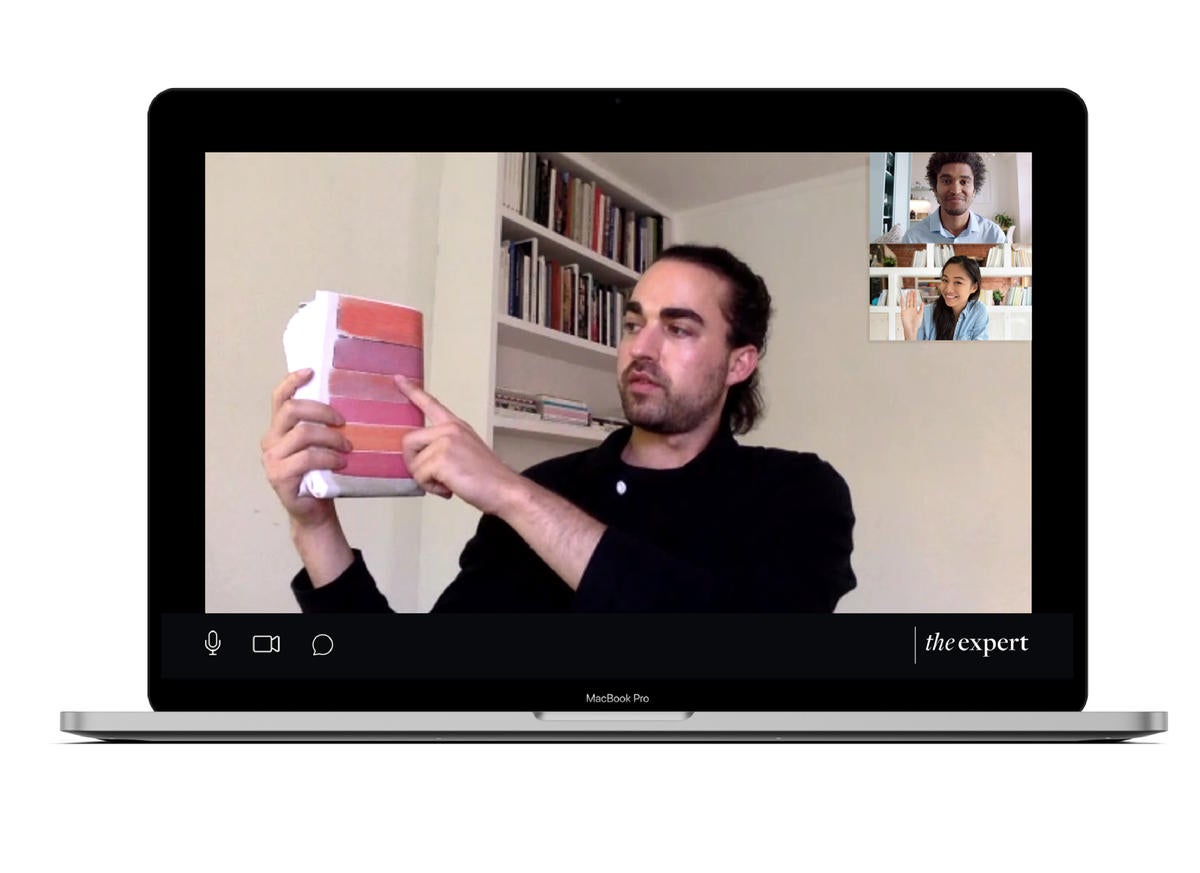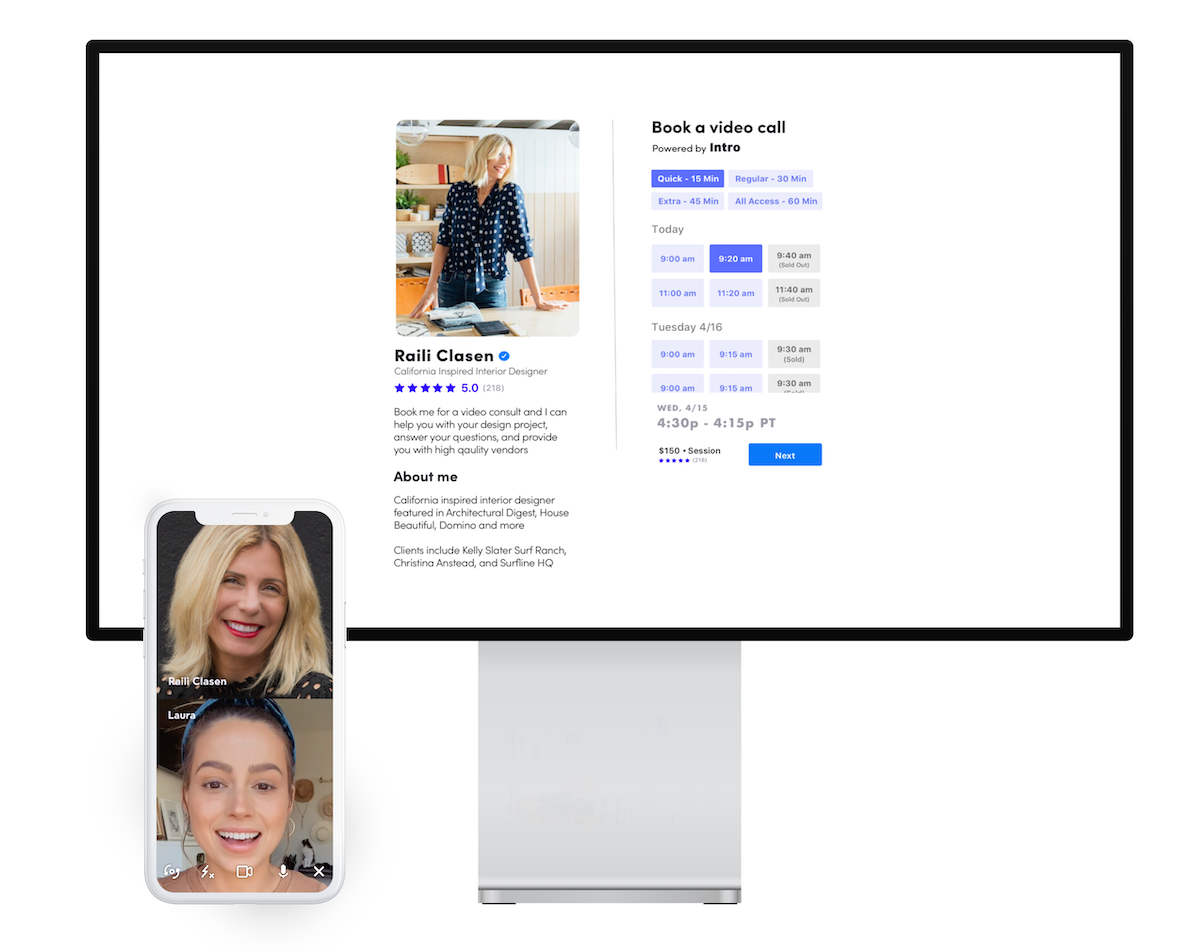Clever business ideas tend to involve a little bit of alchemy—turning an annoyance into an opportunity, lead into gold. Early last year, entrepreneur Leo Seigal was helping his friend, buzzy Los Angeles–based designer Jake Arnold, with his Instagram account, and had a thought: Why not turn an overstuffed, unmanageable inbox into a revenue stream?
“I couldn’t believe how many people were DMing him! Every week he would get hundreds of messages from people asking, ‘What should I do with my curtains?’” Seigal tells Business of Home. “My thought was, How do we create a model so that you can help all these people?”
To test the idea, Seigal pretended to be Arnold’s assistant and scheduled a Zoom call with a curious Instagram fan, charging $400 for an hourlong consultation. The price didn’t raise an eyebrow, and the client loved it. “It went so well that Jake was like, ‘We need to make this into a real platform, there’s money to be made here,’” says Seigal.
Almost a year later, the two are launching The Expert, essentially a streamlined, branded version of that early Zoom call. (It’s also more expensive: Arnold has upped his rate to $1,250 for an hour.) To provide the design firepower, they’ve assembled a murderers’ row of talent, ranging from Martyn Lawrence Bullard to Leanne Ford to Bobby Berk.
At the same time, another L.A.-based entrepreneur, Raad Mobrem, is launching a platform, Intro, with a slightly different spin on the same concept. Together, the two new ventures represent a potential new path forward for the burgeoning e-design industry—one that takes the radical step of making designers themselves the most valuable asset.
There’s nothing revolutionary about the concept behind The Expert. Last year, as the pandemic shut down in-person meetings and temporarily killed the pipeline for new business, thousands of designers across the country scrambled to find a way to offer virtual services. Some developed a complex process, with digital mood boards and renderings. But, others, like Arnold, simply booked video chats. The idea and the underlying technology are not new.
However, by bringing serious star power to the table and streamlining an ad hoc process into a modern e-commerce experience, Arnold and Seigal have struck on a formula they believe has serious legs. Their concept gets at the heart of what people really want from a virtual design experience. Is it a beautiful rendering and a shoppable list of product, or direct access to a design world celebrity?

“There are e-design platforms out there where a random designer in a random place will design a room for you—we’re very much not one of them,” says Seigal. “People don’t want an e-design service. They follow Jake, they follow Martyn Lawrence Bullard. They want the AD100, Elle Decor A-List designer. They admire their work. The designers on our platform are the ones whose work is on all of our clients’ inspiration boards.”
What happens when you build a service around delivering access to top designers? A radically simple platform. The Expert allows clients to browse designers (there are currently 71 on the site) and schedule and pay for a 55-minute consultation via Zoom. That’s it. There are no 3D renderings, no purchasing engines, no checklists of product and no shipping logistics. The site doesn’t get involved in purchasing at all. It simply sets up a Zoom appointment and gets out of the way.
So far, the results have been encouraging. The Expert soft-launched last fall, and though Seigal declined to provide exact figures, he says the platform has generated six figures in revenue, without spending a dime on marketing. (One of the ingenious aspects of the platform is that the experts come with a significant built-in audience.)
In that span, Arnold has conducted more than 30 sessions with remote clients, some as far-flung as Sweden and some as nearby as Brentwood. While the extra revenue is nice, he says one of the happy surprises has been working with superfan clients—a factor that is part of the appeal for designers who are already doing fine financially.
“I’ve always said that I hate that I can only reach out to a certain amount of people,” he says. “[These consultations] are like what I do every day, but instead of having to do presentations or maybe [the client] is uncertain, these people are holding on to every word I have to say because they have an hour to speak! They’re taking notes, fully taking in what I have to say.”
Seigal and Arnold say they’ve built the platform with the trade in mind. Designers set their own availabilities and determine their own process for working with clients. They’re also free to set their own rate (the site takes a 20 percent commission on the fee). Given that many of the featured designers are fairly busy, Seigal says he advised The Expert’s experts to pick a rate that “made them feel comfortable taking time out of their day.”
The result is some fairly steep pricing. An hour of Bullard’s time will cost customers $1,500. Ford and Michael S. Smith command the same rate. Admittedly, there's more affordable designers on the platform, but by and large, The Expert is not cheap. That’s partially by design, say Seigal and Arnold, as they want the brand to retain an air of luxury and exclusivity. However, they say that what justifies the price and sets The Expert apart from apps like Cameo is that customers are buying actionable information, not just celebrity access.
“Sometimes people message, ‘I want to do a session with Jake but that’s more than a top lawyer in Manhattan. Why is an hour worth $1,000?’” says Seigal. “The honest answer is that it’s not about the hour, but everything Jake tells you. The furniture he tells you to buy and not to buy, and all the tips and tricks. He saves people tens of thousands of dollars because they spent that $1,000 getting their questions answered by a true expert. It’s an investment.”
While Arnold and Seigal come to their venture from a design industry perspective, Mobrem is approaching the model from a Silicon Valley mindset, with serious tech bona fides. In the early teens he founded an enterprise software company called Lettuce, which was acquired in 2014 by Intuit and went on to become the basis for QuickBooks online. A couple of years ago, he began working on a new startup, one that would help groups of like-minded people connect and meet up in real life. Then 2020 happened, and the venture hit some obvious roadblocks. Fortunately, he had another idea in his back pocket.
“I was setting up my home here [in Los Angeles], and I liked doing it myself, but I had so many little questions,” he tells BOH. “I didn’t have an interior designer I could reach out to, and I was thinking, How cool would it be to have someone to get quick advice?”
Mobrem began developing Intro, which soft-launched late last year. The app’s basic format is simple: Users create an account, log in, and browse a marketplace of experts in various categories—wellness, style and beauty, astrology and home decor. They can then schedule and book a 15-minute consultation with their chosen expert (the functionality to book longer consultations is forthcoming).

The decor category, which Mobrem says is the platform’s most popular, currently has seven designers in it, including Nate Berkus, Raili Clasen and Shawn Henderson. Prices range from $39 per session up to $150. (Mobrem says the platform pays designers a percentage of the fee, but declined to provide an exact amount.)
“It’s a pure marketplace. Designers can set their own prices and set their own availability. … I think of this as a complementary solution—it’s not one that’s going to replace their main business, but if designers open themselves up to bookings on the platform, they’re getting bookings,” he says.
Intro is similar in theory to The Expert, but the execution is quite different. Mobrem’s platform is more mobile-oriented, and the payment, scheduling and video chat are all native to the app—customers don’t have to use Zoom to connect with their chosen expert. It has far fewer design stars, but a more sleek consumer interface. Put simply: Intro feels much more like a product of Silicon Valley than La Cienega.
No surprise, then, that Mobrem wants to scale the platform, in every direction. Within the design world, his goal is to allow essentially any designer to use the app to book a consultation with a client. (Intro is currently accepting applications.) If it gets traction, the end result would be a massive marketplace. The most popular and well-rated designers would be elevated and promoted by the platform, while the vast majority would use the app to conduct individual transactions with clients who pop up in their DMs. (The idea being: “Sorry, can’t take on new projects right now, but hit me up on Intro!”)
Mobrem sees huge room for growth far beyond the lifestyle categories he has currently staked out. “We want to become the place for people to connect and get exceptional advice about anything,” he says. “The goal is to give everyone access to anyone.”
Although the two platforms have clear similarities, their underlying propositions are very different.
The Expert brings star power and elite cache. It’s, in essence, an exclusive club. Clients will pay a premium to buy into it, and other designers will likely hustle to try and get a membership. In that sense, The Expert may ultimately end up being a very healthy revenue stream to a small number of designers. It also may prove difficult to scale. After all, the more members a club has, the less exclusive it starts to feel. (Arnold and Seigal say they’re planning a MasterClass-like education program that will make their experts’ insights accessible at a lower price to a wider range of customers.)
Mobrem’s creation has less celebrity sizzle and a more democratic model. It may prove more difficult, in an open marketplace like Intro, for a designer to charge $1,500 for an hour of their time. However, the platform may ultimately make it easier for a larger number of working designers to painlessly book consultations.
It’s possible that both Intro and The Expert can take off and coexist, or that this will be a zero-sum game, or that other entrepreneurs will enter and win the space, or that Facebook will copy the model or acquire everything. Tech entrepreneurship is unpredictable that way. Whatever happens, the platformization of the video chat model for e-design is probably a net good for designers.
Here’s why. Forget the drama of Laurel & Wolf, forget the millions backing Havenly and Modsy, forget the sad collapse of Homepolish. At base, shaping an e-design business is not much different than a “traditional,” in-person firm: You have to figure out whether you make most of your money on the design part or the shopping part. Most major platforms are doing the latter. They offer aggressively priced room designs (sometimes as low as $79) and then hope to make a margin on what the customer buys. The end result is a business model that's always going to exert downward pressure on what designers are paid.
Sites like Intro and The Expert are the exact opposite. The appeal for clients isn’t a hyperrealistic 3D model of a living room or a great deal on a sofa. It’s the skill, knowledge and empathy of the designer on the other end of the call. While tech platforms will always have their own incentives, if video consultations become the dominant version of online design, designers may finally be able to claim a bigger slice of the e-design pie. At the very least, they won’t be replaced by AI. Who wants to book a Zoom chat with an algorithm?
Homepagephoto: A design by Studio Jake Arnold | Jonathan Hokklo




























